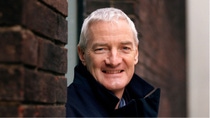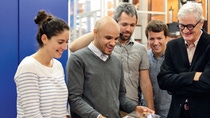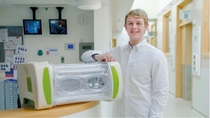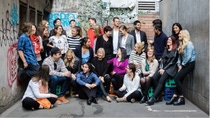Frustration can be the mother of invention

Sir James Dyson’s inventions have earned him huge commercial success and international recognition. With the James Dyson Foundation, the British industrial designer intends to inspire the next generation of engineers.
There’s a global shortfall of engineers,” says Sir James Dyson, whose bagless vacuum cleaners and high-speed hand dryers have made him a household name in many parts of the world. Founded as a one man business in the UK in 1978, Dyson now sells its products in 72 countries and employs over 1,000 engineers worldwide.

Dyson is passionate about the power of design engineering to do good and so concerned about the lack of engineers that, in 2002, he set up the James Dyson Foundation, dedicated to nurturing the next generation. “To fulfill current demand we need to produce 69,000 engineers a year in the U.K. alone. Today we only produce a mere fraction of that,” he says. “I set up the Foundation to help combat this decline.” He hopes the Foundation will help make engineering as attractive to young people as other creative industries.
Today, the Foundation supports education in engineering, design and technology across the world, donating almost €70.2 million (£50 million) so far. The free educational resources it supplies to classrooms and workshops provide hands-on experience that helps to “ignite young people’s passion for design engineering,” says Dyson, while each year the James Dyson Awards challenge students to design “something that solves a problem,” with the winner receiving €42,000 (£30,000) to develop their invention.
“Last year’s international winner really struck a chord,” says Dyson. The problem James Roberts set out to solve was the high number of premature babies dying each year through lack of proper incubation. A student from Loughborough University in England, Roberts designed an inflatable incubator which provides the same performance as a €42,000 (£30,000) modern incubation system, but costs just €351 (£250) to manufacture, test and transport. “He’s finished prototyping his machine and it’s being tested in real-life conditions,” says Dyson. “In a year he’s come a long way, but as with all new ideas, success comes with time. He’s one to watch.”

If time is a vital ingredient, so is tenacity. One of the Foundation’s key philosophies is not being afraid of failure – learning from mistakes and turning them into something unexpected. The students enjoy the process: Building a prototype, finding out which elements don’t work and going back to the drawing board. “Failure fuels invention. As an inventor you must be persistent and not be afraid to take risks,” says Dyson, adding that it took more than 5,000 prototypes and 5 years to develop the first of his famous bagless vacuum cleaners. “Each prototype took me one step closer to success, or prompted me to challenge how I was going about the process. It was arduous, but frustration is a catalyst for better invention – it’s something I instill in the engineers we have at Dyson today. You have to experience frustration and understand the problem in order to solve it.”
If he could give one piece of advice to a budding young designer, what would it be? “Perseverance!” he says. “If you are fuelled by frustration and see that you’re progressing to a viable solution, persist against the odds. There will be setbacks and hurdles. But without these you won’t learn to succeed.”


